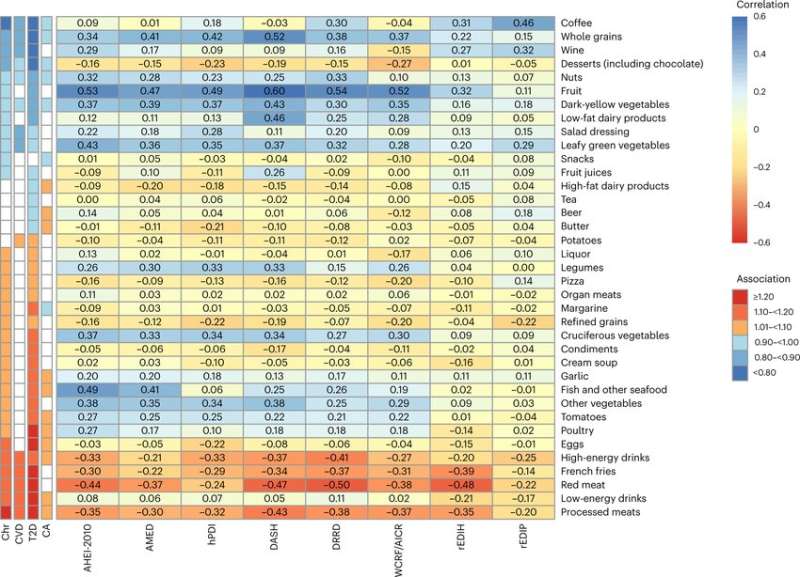
Researchers at the Harvard T.H. Chan School of Public Health in Boston, Massachusetts, have good news for anyone sticking to a healthy diet: Good food choices are associated with a lower risk of developing a chronic disease.
In a robust review of several recommended diets, the study, “Optimal dietary patterns for prevention of chronic disease,” published in the journal Nature Medicine, found that falling in line with any one of them is linked to better health outcomes.
To find the influence of recommended diets on health outcomes, researchers analyzed 32 years of data from 205,852 participants between 25 and 75 years of age when data collection began. The cohorts included 162,667 women from the Nurses’ Health Study and Nurses’ Health Study II and 43,185 men from the Health Professionals Follow-up Study.
Participants regularly reported details about their lifestyle, medical history and food intake, with a median follow-up of 26 years per participant. There were 44,975 major chronic disease events observed, 12,962 major cardiovascular diseases, 18,615 cases of diabetes and 17,909 total cancers.
While individuals in the study were not explicitly adhering to recommended diets, the study categorized reported diets into levels of adherence on a weighted system. It compared health outcomes against levels of adherence to several dietary pattern groups: Alternative Healthy Eating Index-2010, Alternate Mediterranean Diet, Dietary Approaches to Stop Hypertension, Diabetes Risk Reduction Diet, Healthful Plant-Based Diet Index, reversed Empirical Dietary Index for hyperinsulinemia, reversed Empirical Dietary Inflammation pattern, or World Cancer Research Fund/American Institute for Cancer Research diet.
Participants were then ranked by comparison of the top 90th percentile vs. bottom 10th percentile in adherence. Overall the study found that regardless of which diet pattern an individual was most adhering to, being near the top of any of them correlated to lower disease risk. So, for instance, an individual might make it into the top 90{33c86113bcc32821f63c6372852a0f501e07fff55ce3ce61b15b246c5f8c531c} in the Healthful Plant-Based Diet Index but fall below 90{33c86113bcc32821f63c6372852a0f501e07fff55ce3ce61b15b246c5f8c531c} adherence in others due to coffee or wine intake.
Individuals who adhered to guidelines designed to lower the risk of inducing inflammation, high blood insulin levels or diabetes were less likely to develop type 2 diabetes, heart disease and cancer.
Certain food groups were linked to worse health outcomes. Diets that frequently included processed meats, energy drinks, red meat, french fries, and eggs were positively associated with major chronic diseases.
Consuming larger amounts of coffee, whole grains, wine and desserts had lower risk of associated major chronic diseases. However, it should be noted that these were pulled from groups of dietary patterns with many associated food intake strategies. Unfortunately, there was no coffee, whole grain, wine and dessert-based diet to choose from.
More information:
Peilu Wang et al, Optimal dietary patterns for prevention of chronic disease, Nature Medicine (2023). DOI: 10.1038/s41591-023-02235-5
© 2023 Science X Network
Citation:
Adhering to recommended diets lowers risk of chronic diseases, 32-year study finds (2023, March 16)
retrieved 17 March 2023
from https://medicalxpress.com/news/2023-03-adhering-diets-lowers-chronic-diseases.html
This document is subject to copyright. Apart from any fair dealing for the purpose of private study or research, no
part may be reproduced without the written permission. The content is provided for information purposes only.




More Stories
Hanco’s: Bringing the Flavors of Vietnam to Brooklyn
TropiBowls Bring Healthy Food to Tamarac • Tamarac Talk
How can we make our brains prefer healthy food? – study